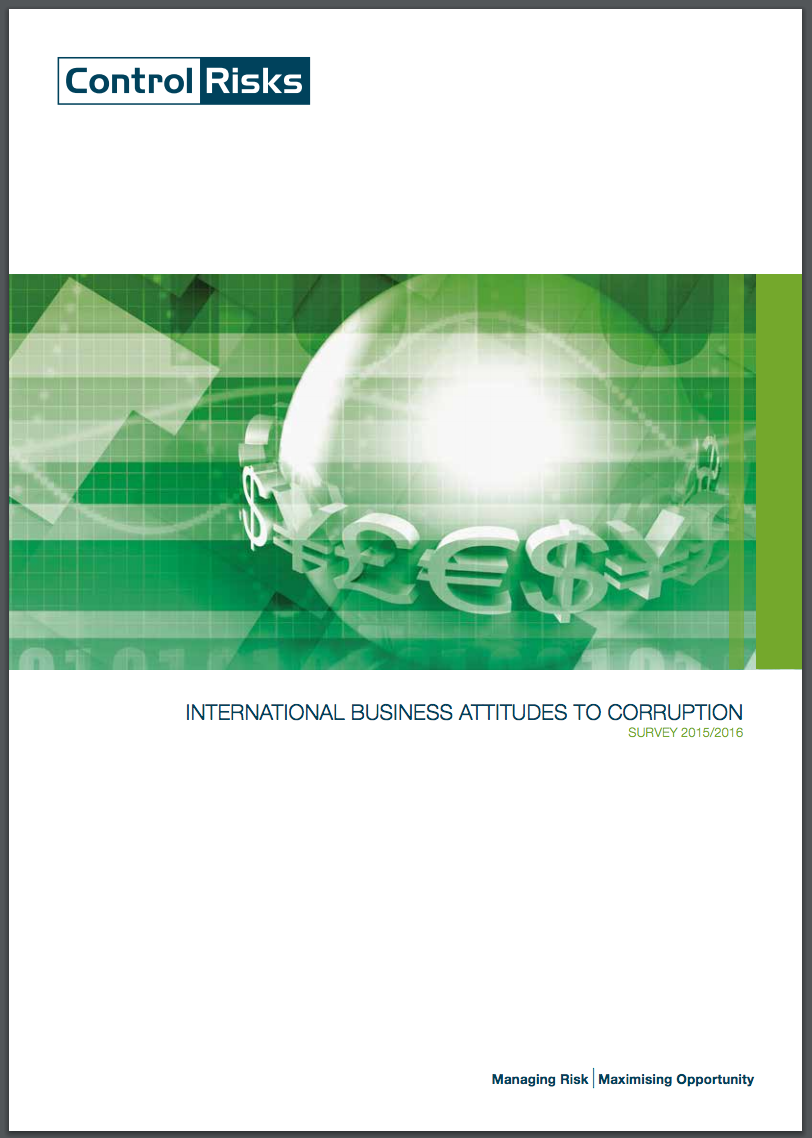An important announcement: The United States government is currently offering millions of dollars to highly motivated individuals anywhere in the world for certain information available right within their own workplaces.
To learn more about this remarkable offer from the United States Treasury, do some quick Internet research on the Foreign Corrupt Practices Act (FCPA). This once obscure law, now in force for almost 40 years, is justifiably feared in the C-Suites of corporations worldwide. Through its increasingly aggressive use by the U.S. Department of Justice (DOJ) and the Securities and Exchange Commission (SEC), the U.S. government has recovered billions of dollars from a long list of corporations, many of them foreign entities over which U.S. regulatory authorities might normally have little or no jurisdiction.
The cases just keeping coming, and the facts (and legal theories) just get better for the government—and for whistleblowers who understand just how impressive a hand they may hold.
As long as humans are fallible and there is corruption in this world, the FCPA statute should be studied by anyone, anywhere, who works or has worked for a company that does any form of business with foreign governments and their employees and agents. Likewise, if you think a competitor, vendor or client is engaged in such business, one can report them as well. Even if your company is already under investigation, you can still be a whistleblower, depending on the circumstances.
To put it very simply, the FCPA’s anti-bribery provisions make it “illegal to corruptly offer or provide money or anything of value to officials of foreign governments, foreign political parties or public international organizations with the intent to obtain or retain business.”1 There are also accounting provisions requiring the keeping of accurate books and records, as well as internal control provisions requiring the company to devise and maintain internal accounting controls to prevent and detect FCPA violations.
We will address these very “whistleblower-friendly” provisions below.
What matters is the intersection of the FCPA with the SEC’s Dodd-Frank whistleblower program, which offers awards of as much as 30 percent of the multimillion-dollar penalties the SEC and DOJ routinely exact from companies who are found to have violated the FCPA. In any given year, a small but usually very wealthy group of corporations from around the world runs afoul of this law, leading to large settlements with the SEC and sometimes the DOJ (for which the whistleblower will also get credit, provided there is an SEC settlement in the package). In FY 2015 alone, the SEC filed 14 actions for FCPA violations and obtained over $215 million in financial remedies. When you tie together the FCPA and the whistleblower law, you have a powerful combination.
In fact, there is $400 million presently available in a special fund for the SEC to pay qualifying whistleblowers that supply original information (as defined in the law) leading to SEC cases which result in penalties exceeding $1 million. The largest single whistleblower award to date has been $30 million. This and 21 other awards have been given out through FY 2015, totaling over $54 million. Providing tips about FCPA violations is only one way of obtaining awards (any securities law violation is eligible), but it is clearly one of the most lucrative.
A list of the larger recent FCPA settlements and the companies that paid them since 2013 alone reads like a page of International Fortune 500 companies:
- Alstom (French conglomerate): $772 million (DOJ case, largest ever)
- Total S.A (French oil and gas co.): $398 million
- Alcoa (aluminum): $384 million
- Weatherford International (oil and natural gas services): $152.6 million
- Avon (health care): $135 million
- Hewlett-Packard (high tech): $108 million
- Diebold (ATMs, security systems): $48 million
- BHP Billiton (mining): $25 million
- Hitachi (Japanese high-tech conglomerate): $19 million
- Goodyear (tire and rubber): $16 million
- BNY Mellon (U.S. bank): $14.8 million
- Bristol-Myers Squibb (pharma): $14.7 million
- Stryker Corporation (medical devices): $13.2 million
- Mead Johnson (infant formula): $12 million
- FLIR Systems (sensing devices): $9.5 million
- Parker Drilling (oil field services): $4 million
- Koninklijke Philips Electronics (electronics, health care): $4.5 million
None of these cases were overly complicated. Most basically involved some form of bribery of foreign public officials or broadly defined ” state actors” (example: doctors in countries where the government runs the health care system). Some cases were based on the bribes themselves; some cases just on violation of the broad accounting provisions. The bribes were paid all over the world: Middle East, Africa, Europe and the Far East. The companies that violated the FCPA are both foreign and domestic. Two French companies paid a total of over $1 billion.
An observant employee, former employee or vendor or customer of any one of these companies — or the employee of a competitor — might have given the tip that bribes were being paid to such parties to get or retain business. The bribes could even consist of such nontraditional payoffs as “world tours,” gift cards, contributions to a political party or hiring the unqualified children of public officials. Even commercial bribery (kickbacks to or from vendors, agents, etc., an offense that has been going on for centuries) not involving public officials may qualify. Whistleblowers in any of these cases, provided they satisfied the SEC rules, could become millionaires, courtesy of the U.S. government.
The SEC does not announce which of its FCPA cases qualify for whistleblower awards, but it does provide year-by-year statistics on how many whistleblower tips it receives and how many were FCPA-related. Given the large amounts that may be available for awards, it may come as a surprise that over the five years of the program, less than 5 percent of whistleblower tips have concerned possible FCPA violations. For example, in FY 2015, of the nearly 4,000 tips, only 186 related to the FCPA.2 As Mike Koehler, the “FCPA Professor” recently observed: “I stand by my prediction-now 5.5 years old, that Dodd-Frank’s whistleblower provisions will have a negligible impact on FCPA enforcement.”3 He may be right (or not, since the SEC does not disclose this information). Recent statements by SEC officials suggest that the role of whistleblowers in FCPA cases may be considerably more than “negligible.” At a recent FCPA panel discussion, the Chief of the SEC’s FCPA unit indicated that the input of whistleblowers has become important to the FCPA enforcement program.4 Yet if only 186 out of 4,000 tips had anything to do with the FCPA, there appears to be an untapped opportunity for an astute whistleblower of any nationality to receive a substantial sum of money from the U.S. government, provided he or she supplies original information leading to an SEC case involving a violation of the FCPA and meets the various other criteria.
FCPA cases are often filed against large multinational corporations who can afford to, and do, always settle and pay large penalties, and pay on time (usually within two weeks of the filed settlement order). These are often large banks, big pharma companies, medical equipment, high tech, and companies in the “extraction” industries (mining, energy) that do significant business around the world. No problem with collecting the money from this crowd. Indeed, with worldwide commodity prices (including the price of oil) way down, the increasing pressure on companies in these sectors to make a profit may mean that more FCPA violations will occur.
Most are subject to SEC jurisdiction by trading on U.S. stock exchanges, including foreign-based companies trading with ADR’s (American Depository Receipts). While the FCPA law started off slowly in the 1970s, it reached critical mass in the 1990s, led by creative and relentless government lawyers like Mark Mendelsohn at the DOJ and, more recently, by expanding FCPA units at the hands of a series of aggressive Chiefs of the SEC and DOJ. In corporate suites around the globe, this once obscure and widely disregarded statute is now among the most feared weapons in the U.S. government’s enforcement arsenal. Few if any comparable examples exist of the brute exercise of extraterritorial legal authority by one country over the business activities of others.
The FCPA Juggernaut
Today, the FCPA enforcement teams at the SEC and DOJ are humming along, staffed with highly competent attorneys who take their jobs very seriously. They are always looking for new cases and welcome whistleblowers of all nationalities. The government lawyers quickly embrace credible individuals (i.e., no crackpots) who present viable evidence of potential FCPA violations. Documents, especially emails, are very much appreciated. The government lawyers do not want privileged material, but just about everything else is welcome. The whistleblower may report directly or through an attorney (which is necessary if the whistleblower wants to remain anonymous).
The head of the SEC Enforcement Division, Andrew Ceresney, said recently “pursuing violations of the FCPA remains a critical part of the SEC’s enforcement efforts. The SEC has taken a lead role in combating corruption worldwide…”5 Furthermore, the SEC is now receiving assistance from as many as 11 foreign enforcement authorities. This can help immensely when it comes to obtaining foreign witness testimony and documents.
Once an investigation starts, the usual pattern is for the target company’s management to engage a major (usually U.S.) law firm to complete a comprehensive “internal investigation,” in which teams of very competent lawyers (often SEC or DOJ alumni) scour the company’s records from one end of the world to the other to uncover every shred of evidence relating to alleged foreign bribery schemes. The outside law firms sometimes identify evidence that the government probably would never have uncovered, given its limited resources and the legal obstacles to obtaining such evidence abroad. The outside lawyers can locate and interview witnesses and retrieve documents and report their information directly to the SEC. In the “old days,” corporate lawyers would try to bury the government lawyers in paper. Now they know enough to pick the smoking emails and get them in quickly, or else. As they unfold, these investigations take on a life of their own and are generally very helpful to the government. Ultimately, they assist the SEC/DOJ in making the case against their own clients, but in return the client companies often get “credit” (in the form of lesser penalties) for their cooperation.
This cooperative self-enforcement system, which would have been unthinkable a generation ago, is now standard practice among the SEC, the DOJ and corporations worldwide. The name of the game is to cooperate, investigate, negotiate and settle. Monitors and deferred prosecution are sometimes part of the resolution, although — as companies get more sophisticated and effective with their compliance programs — the age of monitors is fading. High-ranking corporate officials are seldom charged in these resolutions, although the DOJ has recently decreed that individuals who did wrong should also be charged (this may further elevate the value of whistleblowers who can provide direct evidence against top managers). Woe to the company and the officers that try to bury an incriminating email that later turns up in a whistleblowers’ submission.
In the end, the amount of the settlement, often heavily negotiated, is not the real crux of the deal for the target companies. The settlements are often multiple millions of dollars; to many of these companies, while not exactly a “parking ticket,” this is nevertheless an amount they can handle (usually by “reserving”—a polite term—enough to cover the payout to the government). The key company objective is, in the familiar jargon, “to get this matter behind us and get back to business.”
All of this high-powered legal maneuvering leading to a big settlement for the humble whistleblower that started the ball rolling. How often can you have dozens of very smart lawyers working at someone else’s expense to make money for you? The whistleblower will typically be interviewed by the government one or more times and will be encouraged to provide to the enforcement attorneys documents that can be particularly important at the early stages of an investigation to guide them regarding what they should demand from the company. Documents, especially emails and perhaps some kept out of the ordinary course of business, can be of particular value in these cases, where most witnesses are abroad and generally beyond the reach of SEC subpoenas. Damaging emails in particular are prized, for they are “set in stone” and not subject to changed recollections or sudden amnesia. In the age of the email with a dozen people on the “cc” line, the government typically has numerous folks to interview. One email that acknowledges a bribe has been paid to a foreign government official can be “worth its weight in gold.” The whistleblower can also serve as an insider to help the SEC learn the employees or managers who should be interviewed from among potentially thousands of employees spread across the globe in a sprawling multinational corporation. The whistleblower law provides that this form of help is viewed favorably in determining an award. The government expects the whistleblower to deliver the goods and generally appreciates the help.
Likewise, corporations are strongly encouraged by the SEC and DOJ to “self-report” FCPA violations; it now appears they must do so to get full cooperation credit (in FY 2015, the SEC gave “significant credit for cooperation in more than half a dozen cases”).6 In particular, if the company intends to ask for a so-called NPA or DPA (non- or deferred prosecution agreements, akin to being put on “corporate probation”), they will almost always have to self-report. In the age of the whistleblower, not reporting an FCPA violation, even a small one, is very risky. Many cases are still uncovered by means other than corporate self-reporting, including from whistleblowers. Most whistleblowers are current or former company employees. A whistleblower can go to the SEC without “reporting up” inside the company, but according to the SEC, almost all do make some sort of complaint or report to the company first. Those who go to the SEC typically have been ignored or given the runaround by the company. A whistleblower can even go to the company first and still qualify for an SEC award if she reports the same information to the SEC within four months. This provision has put pressure on companies to make a quick initial report to the SEC shortly after learning of the problem, whether from a whistleblower or elsewhere, for fear of getting to the SEC after a whistleblower has already been there. Either way, the information gets to the SEC, and the whistleblower should get the credit.
As we have seen, regardless of how it starts, once an SEC investigation commences, the normal end result, which can take several years (often longer), will be a healthy settlement that often exceeds the $1 million minimum needed for a whistleblower award. The hardest part for the whistleblower may be making make the decision to “cross the Rubicon” and become a whistleblower. From that point on, they should be in the capable hands of experienced counsel (working on a contingency fee, in all likelihood) and the SEC or DOJ staff, who will be soon inclined to treat them as a trusted colleague (as long as the whistleblower tells “the whole truth and nothing but the truth.”)7
This piece was originally shared on Mondaq and is republished here with permission. The content of this article is intended to provide a general guide to the subject matter. Specialist advice should be sought about your specific circumstances.
Check back on March 2 for the second installment!
Footnotes
[1] Gibson Dunn, 2015 Mid-Year FCPA Update, at 1 (July 6, 2015). [2] FY 2015 Annual Report to Congress of the SEC Office of the Whistleblower, p.28. [3] FCPA Professor, Nov. 23, 2015 [4] FCPA Recent Developments, DC Bar Program, Dec. 16, 2015, remarks of Kara Brockmeyer. [5] Andrew Ceresney, ACI’s 32nd FCPA Conference Keynote Address, Nov. 17, 2015, p.1 (available on the SEC website). Mr. Ceresney also cautioned “companies are gambling if they fail to self-report FCPA misconduct to us.” [6] Ceresney, ACI’s 32nd FCPA Conference Keynote Address, n. 4 supra, p.2. [7] See Daniel J. Hurson, “10 Rules for Becoming A Successful SEC Whistleblower,” Mondaq News Service, Sept. 11, 2013.


 Daniel J. Hurson is a principal at The Law Offices of Daniel J. Hurson in Washington, D.C. and Annapolis, MD. He has been a trial lawyer and litigator for more than four decades, with substantial experience in white-collar criminal, securities fraud and internal investigations. He served as law clerk to the Hon. Harrison L. Winter of the United States Court of Appeals for the Fourth Circuit. In its recent opinion in the case of former Enron officer Jeffrey Skilling, the U.S. Supreme Court, in defining the “honest services” theory of mail fraud, cited a law review article on the subject written by Mr. Hurson.
Mr. Hurson has tried cases for the U.S. government both as an Assistant U.S. Attorney in Maryland and later as Assistant Chief Litigation Counsel for the Enforcement Division of the Securities and Exchange Commission. He received the Outstanding Service Award from the Attorney General of the United States for his work as a federal prosecutor. He has prosecuted and defended white-collar criminal cases and political corruption cases, including the prosecution of a sitting governor of Maryland. He has also litigated civil rights, trademark, whistleblower, broker-dealer fraud, insider trading and legal and accounting malpractice cases.
Mr. Hurson has also undertaken the representation of SEC whistleblowers acting under the provisions of the Dodd-Frank Act. He has now submitted a number of these cases to the Enforcement Division of the SEC, which has undertaken multiple investigations now in progress based on information provided by Mr. Hurson’s clients. Mr. Hurson has written extensively on whistleblower issues. His article titled “10 Rules for Becoming a Successful SEC Whistleblower” is widely read on the Internet.
Mr. Hurson represents individuals and corporations before the Enforcement Division of the Securities and Exchange Commission, including FCPA, options backdating, insider trading and financial and accounting fraud cases. He has represented several corporations in bankruptcy-related actions against third-party professionals such as former lawyers and accountants. He has advised Special Committees of corporate boards in evaluating potential third-party litigation arising out of an internal investigation. He has conducted internal investigations for corporations relating to employee allegations and securities issues. He represents individual officers and directors in internal investigations and before the SEC.
Mr. Hurson has taught and lectured on trial practice and securities law at several national law schools and for the ABA and the District of Columbia Bar. He has served as a judge at Georgetown Law School’s white-collar crime national moot court competition. He has counseled first year law students at the employment forum at the George Washington University Law School.
Mr. Hurson has appeared on the PBS Nightly Business Report, the Canadian Business Network, Chinese and Saudi television networks, and has been quoted in Bloomberg’s BusinessWeek, the New York Times and the Wall Street Journal, among other publications. Mr. Hurson is a past Chairman of the Steering Committee of the District of Columbia Bar's Committee on Corporation, Finance and Securities Law, where his section won the Best Section Award during his tenure as Chair. He is a cum laude graduate of Georgetown University, where he was the College Student Body President. He graduated from Harvard Law School, where he was the winner of the Ames Moot Court Competition.
Daniel J. Hurson is a principal at The Law Offices of Daniel J. Hurson in Washington, D.C. and Annapolis, MD. He has been a trial lawyer and litigator for more than four decades, with substantial experience in white-collar criminal, securities fraud and internal investigations. He served as law clerk to the Hon. Harrison L. Winter of the United States Court of Appeals for the Fourth Circuit. In its recent opinion in the case of former Enron officer Jeffrey Skilling, the U.S. Supreme Court, in defining the “honest services” theory of mail fraud, cited a law review article on the subject written by Mr. Hurson.
Mr. Hurson has tried cases for the U.S. government both as an Assistant U.S. Attorney in Maryland and later as Assistant Chief Litigation Counsel for the Enforcement Division of the Securities and Exchange Commission. He received the Outstanding Service Award from the Attorney General of the United States for his work as a federal prosecutor. He has prosecuted and defended white-collar criminal cases and political corruption cases, including the prosecution of a sitting governor of Maryland. He has also litigated civil rights, trademark, whistleblower, broker-dealer fraud, insider trading and legal and accounting malpractice cases.
Mr. Hurson has also undertaken the representation of SEC whistleblowers acting under the provisions of the Dodd-Frank Act. He has now submitted a number of these cases to the Enforcement Division of the SEC, which has undertaken multiple investigations now in progress based on information provided by Mr. Hurson’s clients. Mr. Hurson has written extensively on whistleblower issues. His article titled “10 Rules for Becoming a Successful SEC Whistleblower” is widely read on the Internet.
Mr. Hurson represents individuals and corporations before the Enforcement Division of the Securities and Exchange Commission, including FCPA, options backdating, insider trading and financial and accounting fraud cases. He has represented several corporations in bankruptcy-related actions against third-party professionals such as former lawyers and accountants. He has advised Special Committees of corporate boards in evaluating potential third-party litigation arising out of an internal investigation. He has conducted internal investigations for corporations relating to employee allegations and securities issues. He represents individual officers and directors in internal investigations and before the SEC.
Mr. Hurson has taught and lectured on trial practice and securities law at several national law schools and for the ABA and the District of Columbia Bar. He has served as a judge at Georgetown Law School’s white-collar crime national moot court competition. He has counseled first year law students at the employment forum at the George Washington University Law School.
Mr. Hurson has appeared on the PBS Nightly Business Report, the Canadian Business Network, Chinese and Saudi television networks, and has been quoted in Bloomberg’s BusinessWeek, the New York Times and the Wall Street Journal, among other publications. Mr. Hurson is a past Chairman of the Steering Committee of the District of Columbia Bar's Committee on Corporation, Finance and Securities Law, where his section won the Best Section Award during his tenure as Chair. He is a cum laude graduate of Georgetown University, where he was the College Student Body President. He graduated from Harvard Law School, where he was the winner of the Ames Moot Court Competition. 









